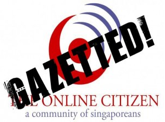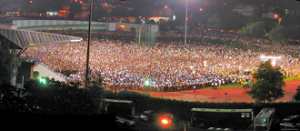Memo #58
Netina Tan – netina.tan [at] utoronto.ca
 Social media including Facebook and microblogging sites such as Twitter galvanized the street protests in Tunisia and Egypt. Fears of contagion have led China to censor ‘Egypt’ on its microblogging sites. As Singapore gears up for its general election, due by February 2012, its long-serving People’s Action Party (PAP) government is increasingly nervous over the impact of social media and is finding ways to muzzle it.
Social media including Facebook and microblogging sites such as Twitter galvanized the street protests in Tunisia and Egypt. Fears of contagion have led China to censor ‘Egypt’ on its microblogging sites. As Singapore gears up for its general election, due by February 2012, its long-serving People’s Action Party (PAP) government is increasingly nervous over the impact of social media and is finding ways to muzzle it.
Unlike the Egyptian government that shut down internet access, the Singapore government uses innovative legalistic techniques to control the cyberspace. Recently, the Prime Minister’s Office clamped down and gazetted “The Online Citizen” (TOC) – a socio-political blog after it organized a public forum for opposition party leaders. As a gazetted political association, the TOC is now bound by the Political Donations Act, which among other things forbids accepting donations from foreign sources.
government uses innovative legalistic techniques to control the cyberspace. Recently, the Prime Minister’s Office clamped down and gazetted “The Online Citizen” (TOC) – a socio-political blog after it organized a public forum for opposition party leaders. As a gazetted political association, the TOC is now bound by the Political Donations Act, which among other things forbids accepting donations from foreign sources.
In May 2010, a new rule was introduced to ban campaigning on the eve of polling day to prevent “emotional voting” and “risk of public disorder”. It remains unclear how the PAP government would monitor online political commentaries on the “cooling off” day. Without specific guidelines, the new rule may encourage self-censorship and give an unfair advantage to the incumbent PAP that controls the mainstream media.
With 78% of Singapore’s population accessing the internet, opposition parties have turned to social media to broaden their support base. Last week, Singapore Democratic Party leader Dr. Chee Soon Juan avoided jail time by raising S$20,000 through an online donation drive to pay his fine for “making an address in a public place without a licence” in 2006.
The current clamp down reflects the PAP government’s insecurity and fear of the large crowds that have turned up at opposition rallies. Not to be outdone, the PAP has spruced up its website with vodcasts and podcasts. Its no-nonsense leaders have also begun Twittering and Facebooking to boost their popularity.
Singapore will not experience the mass movements seen in the Arab world. But to prevent the possibility of a “freak election”, the PAP regime will stay vigilant and repress selectively to prolong its five-decade rule.
About the Author:
Netina Tan is a SSHRC Postdoctoral Fellow, Asian Institute, Munk School of Global Affairs, University of Toronto
Links:
- Access to power: hegemonic party rule in Singapore and Taiwan, University of British Columbia, 2010. (By Netina Tan)
Embedded links in text:
- Singapore gears up for the polls, Today Online, January 2011
- TOC gazetted as a political association, Asiaone News, January 2011
- Pre-Election Squeeze in Singapore, Asia Times, January 2011
- Singapore opposition leader escapes jail term, Radio Netherlands Worldwide, February 2011
Related Memos:
- See Netina Tan’s Memo, Turn of Tide: Singapore’s Watershed Election 2011 (Memo #82)
- Our other Memos about Singapore and Southeast Asia

